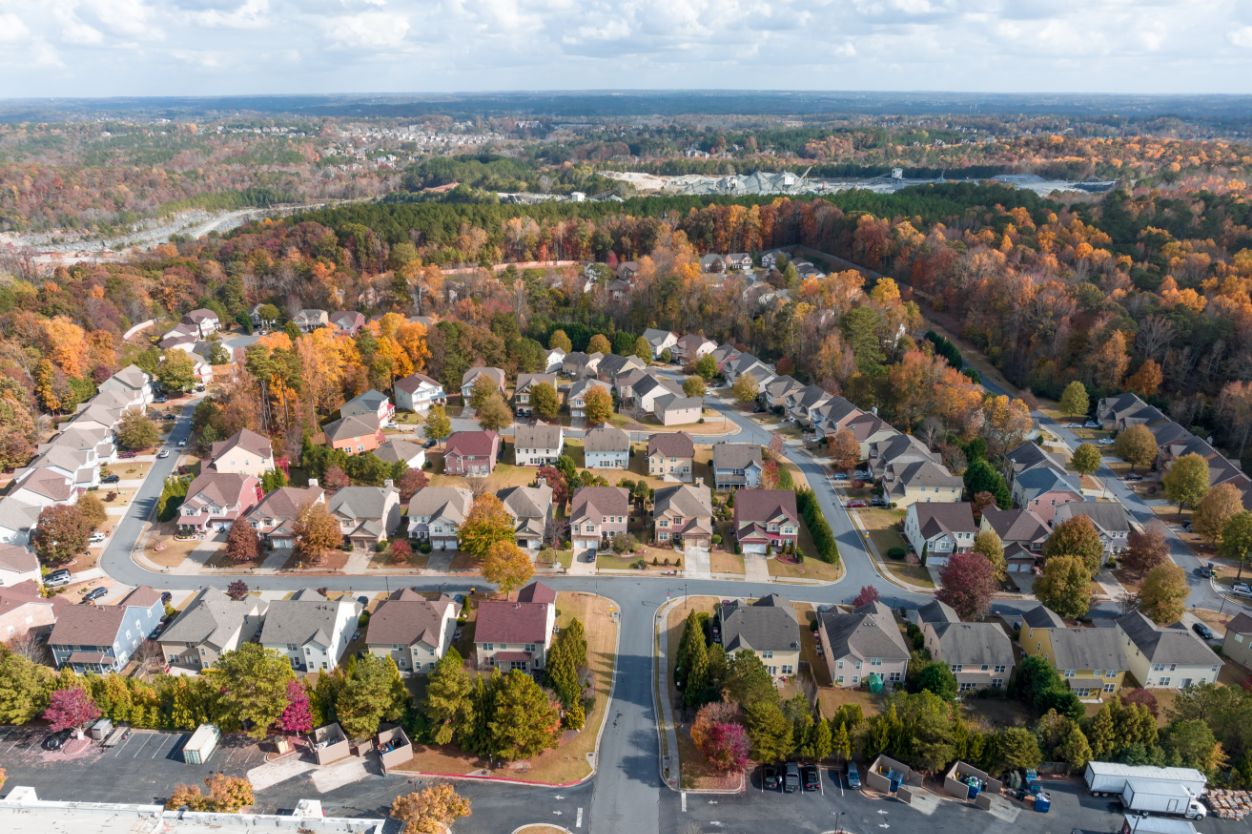Georgia is becoming one of the top-performing real estate markets in the U.S. It’s been named one of the best places to buy a house in 2023, one of the country’s ten strongest housing markets, and the most overpriced housing market in the U.S.
What’s driving the Georgia real estate market? Will it slow down or crash? And why should real estate professionals consider investing here? Read on to find out!
Table of Contents
- Current Georgia Housing Trends
- Georgia's Housing Market Forecast
- Reasons to Invest in Georgia Real Estate
- Let PropStream Help You Make Investment Decisions in Georgia
Current Georgia Housing Trends

In many ways, the Georgia market is behaving much like the rest of the U.S.: Housing supply is down, mortgage rates are up, demand remains steady, and property values are high.
In July, Georgia’s active listing count was down 5.7% year-over-year, with 24,399 homes for sale, newly-listed homes were down 16.2% year-over-year at 14,472, and the monthly supply of homes (the number of months it would take for all currently listed homes to sell) was 2.5 (4 to 5 months is average).
At the same time, housing demand has remained relatively steady, with 32.4% of homes selling above the list price and 44.9% of homes selling under the list price (as of 31 May 2023). The sale-to-list price ratio—which reflects how much above or below the seller’s asking price buyers pay—was 99% in July (100% means buyers are paying the asking price).
This comes at a time when the average 30-year mortgage rate just hit 7.48%, the highest level since the year 2000. Despite this and record-high home prices (the median sale price in July was $405,000, up 1.3% from last year), demand for Georgia homes hasn’t budged much. One potential reason is that millennials, America’s largest generation, are now entering their prime homebuying years and are willing to buy property despite a challenging housing environment.
Georgia's Activity Slowdown
That said, housing activity in Georgia has slowed down. Only 10,610 homes sold in July, down 17.1% from the same period last year, and the median days on market is 43, up 34% from the last year.
Much of the slowdown can be attributed to the housing shortage. Georgia ranks tenth in the nation for its housing deficit, and affordable housing is in particularly short supply. Many potential buyers simply can’t find a home. Of course, this is a nationwide trend; one report shows that U.S. housing market affordability is worse now than at the height of the 2006 housing bubble.
Georgia Housing Market Forecast
Now that you know the state of Georgia’s 2023 housing market, let’s discuss where it’s headed.
Despite some predictions of a U.S. housing crash, there hasn’t been one so far. Additionally, most experts agree that any potential downturn won’t be as bad as in 2008. This is because stricter lending practices have put most current homeowners in a better financial position with more home equity, meaning they are less likely to be foreclosed on.
Though Georgia had the thirteenth-highest foreclosure rate of any state in the first half of 2023 at 0.14%, that’s still low compared to historical standards. Plus, low housing inventory is preventing home values from dropping too dramatically.
Anything could happen. But for now, Georgia’s housing market appears to be stabilizing. Home values remain high despite transactions slowing down.
Reasons to Invest in Georgia Real Estate

For real estate professionals, the question remains whether now is a good time to invest in Georgia or not. Though some market uncertainty persists, the state has a lot going for it:
Strong economy. Georgia’s economy is robust, with an annualized gross domestic product (GDP) growth rate of 2.0% from 2021 to 2022 and 2.1% from 2017 to 2022 (14th highest of any state). The number of businesses in the state has reached 967,006, growing at an annual rate of 3.1% since 2017. Furthermore, its tech sector is booming, with employers such as Apple, Microsoft, and Visa employing thousands.
Low unemployment. The Georgia unemployment rate was 3.2% in July, lower than the U.S. unemployment rate of 3.5%. Lower unemployment levels help encourage demand for homeownership and rental properties.
Population growth. Georgia’s population was over 10.9 million in 2022, growing by 1.9% since 2020. The biggest gains were in suburban and exurban counties, signaling a real opportunity for real estate professionals to capitalize on growing housing demand in these areas.
Low cost of living. Georgia ranks twelfth for the state with the lowest cost of living. Residents pay less in nearly every spending category compared to the U.S. average. This helps attract move-ins who want to stretch their income further.
Local attractions. Known for its warm weather and sunny beaches, Georgia attracts millions of visitors each year. It’s also home to the 22-mile Atlanta BeltLine, one of the largest, most wide-ranging urban redevelopment projects. Such attractions help make Georgia a top destination for tourists and new residents alike.
Let PropStream Help You Make Investment Decisions in Georgia
To narrow down where to invest in Georgia, it’s best to analyze neighborhoods that meet your criteria. How can you analyze neighborhoods effectively? Two words:
PropStream It!
With PropStream, you can search for properties (and their owners) by various filters, such as days on market, occupancy status, property characteristics, equity information, and much more. This way, you can target areas with the most potential.
Want to try PropStream on for size? Sign up for your 7-day free trial today and get 50 leads on us!
Notes on sources:
- Data on Georgia's active listing count, new listing count, median listing price, and median days on market taken from Realtor.com® Economic Research
- Data on Georgia's economy taken from IBISWorld
- Data on U.S. and Georgia unemployment rates taken from the Bureau of Labor Statistics (BLS)
- Data on Georgia's population taken from U.S. Census Bureau (unless otherwise cited)
- Data on Georgia's cost of living taken from the Missouri Economic Research and Information Center
